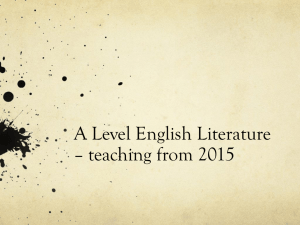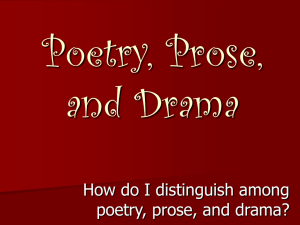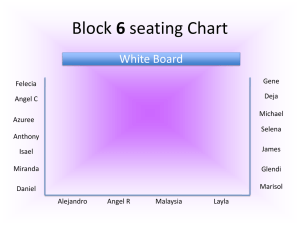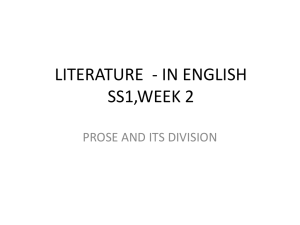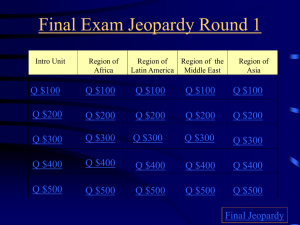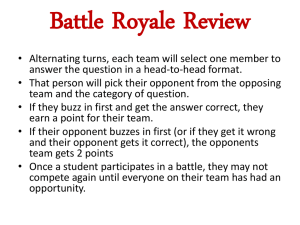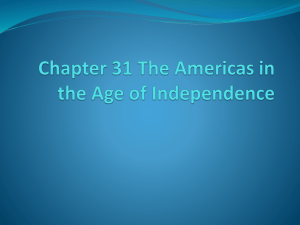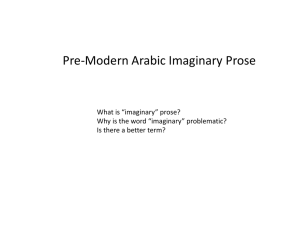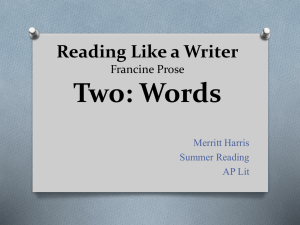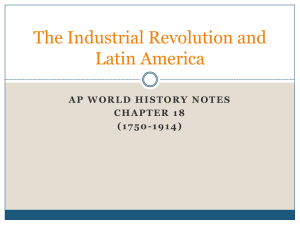Latin Literature
advertisement
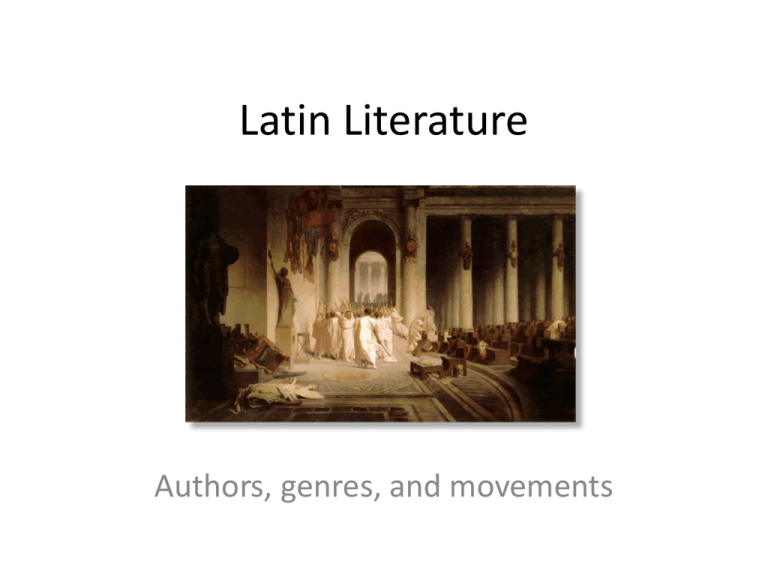
Latin Literature Authors, genres, and movements Timeline of Latin Literary development •Pre-classical – Epic poetry is written in Saturnines, and later dactylic hexameters. Ennius is considered the father of Latin native poetry (instead of translations from Greek). Cato the Censor. •Greek connection – 1st Punic War •Golden age – This covers the timeframe of the late Republic through the early empire – generally coinciding with the Cicero-Augustus period. The most famous Latin works of prose and poetry generally come from this era. •Silver age – These are post-Augustan writers, generally (considered by modern audiences to be of lesser quality, although there are exceptions. Poets include Statius; the ‘stars’ of this age are the historians and biographers such as Tacitus and Suetonius. •Late Antique – Christian writing begins to dominate the late Empire, and ‘vulgar’ Latin begins to take dominance over Classical. This is the timeframe of Jerome, Augustine, and other Latin Church Fathers, and poetic developments include Christian hymns, such as those written by Venantius Fortunatus. •Medieval and Neo-Latin – Latin continues to be the international language of scholarship in Europe. Famous authors include such varied writers as Thomas Aquinas and Isaac Newton. Poetry vs. prose Poetry in the ancient world is, by definition, literature written in meter. Prose, therefore, is literature not written in meter. Poetry predates prose in almost all literary traditions. Poetry originally was used for an extremely wide variety of subjects, from epics to histories to handbooks on everything from farm maintenance to the treatment of snakebite. Neoteric Movement. Prose was used in particular for history, biography, philosophy, and letter writing. Many Latin prose authors still retained poetic elements in their writing, especially Livy, who was praised for his lactea ubertas. Latin prose: Prose was any Latin written for literary purposes which was not composed in meter. The most important genres included: • History -- Historians recorded events and achievements in prose, originally in a style called ‘Annals,’ in which the history was subdivided into years. • Philosophy -- In philosophy, authors pondered the physical nature of the universe and the metaphysical questions of the nature and meaning of existence, truth, and morality. • Biography -- Rather than focusing on worldwide events as historians did, biographers recorded details of historical persons to give a detailed view of their life and character. • Letters -- Letters were often published, and were occasionally even written with the intent of being released to the public. These are a particularly useful way to look at life in ancient Rome from the personal level. • Oratory and rhetoric -- Oratory, speechwriting, was done in prose, and was considered the chief pursuit (other than military achievement) of well-born Romans. Rhetoric was the study of how to compose effective oratory. Famous prose authors Livy was a historian who wrote about the history of Rome from its founding to the age of Augustus. Much of his immense work is lost. Tacitus was a Silver Age historian who wrote the history of the early Empire. He is powerful, but difficult to read. Seneca, the advisor to the emperor Nero until he was forced to take his own life, was also a particularly famous Stoic philosopher. He was, and is, criticized for not having practiced what he preached, but some of this may be defamation. Suetonius, a biographer, wrote ‘The Twelve Caesars,’ an account of the character of Julius Caesar and the first eleven Emperors, through Domitian. Many very useful (sometimes contradictory) pieces of information come from his work. Julius Caesar was not only a powerful politician and soldier, but also a popular orator and author of very effective, terse prose commentaries on his military exploits. Cicero is one of the best-known Latin authors. He wrote letters, oratories, philosophies, works on rhetoric, and even some poetry, although it is not up to the standard of his prose work. Poetry Latin Poetry was written in a variety of meters and styles. These included: • Epic -- Epic was dactylic hexameter poetry, generally written about heroes and gods from ages past. Other types of epics existed, however, often containing useful information, like a handbook, that could be memorized and recalled. These were called didactic epics. Lucretius even wrote a great philosophical work, the de Rerum Natura, as an epic. • Lyric -- Generally, lyric poems were much shorter poems that dealt with more personal topics, such as modern characters and emotions. Love poetry and ‘attack’ poems, especially epigrams, were very popular with the Romans. This type of poetry was heavily influenced by Greek neoterism. • Drama -- Drawing from both Greek and native Italian sources, Latin created a system of dramas including , primarily, tragedy and comedy. These works were always written in meter in ancient Latin (as opposed to modern drama; consider Shakespeare as a sort of in-between). Famous Poets Catullus is widely considered the father of Latin lyric poetry. He was a young author who rebelled against Roman societal norms and wrote (often salacious) poems in a variety of meters. He was heavily influenced by the Greek authors Callimachus and Sappho. Vergil is perhaps the most famous Roman poet. His Aeneid was the epic of the founding of the Roman race; he also wrote other works, including the Eclogues and Georgics. Horace was another extremely famous Roman poet. In addition to his many other works, he composed the Odes, which were excellent poems in a variety of styles. Ovid was the last of the Golden Age poets; he wrote love poetry including the Ars Amatoria and the Amores. He was exiled to Tomis on the Black Sea, and wrote the Tristia until his death. Plautus is probably the most famous Roman comic author. The plots of his plays are simple, but his exploration of humour, wit, and dramatic timing and irony made them very amusing to contemporary and modern audiences.
